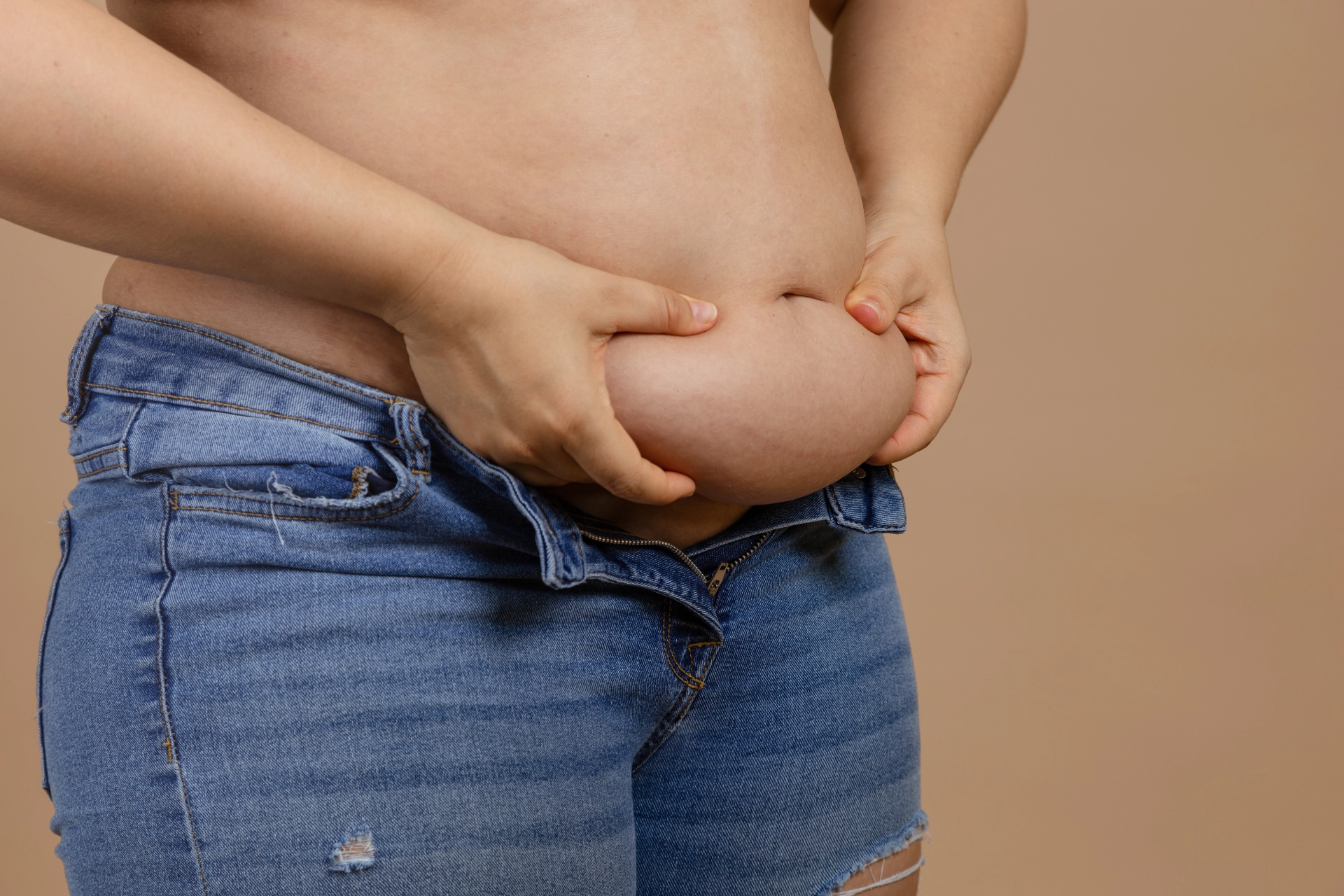Written by Dr. Brandon Rieders, Gastroenterologist
Have you ever wondered whether your swollen abdomen is caused by bloating or fat? Understanding the difference is crucial for addressing the issue effectively. Many people confuse the two, leading to unnecessary frustration or ineffective strategies. In this post, we’ll demystify the distinction between bloating and fat and provide actionable tips for managing both.
What Is Bloating?
Bloating is the temporary swelling or distension of the abdomen, often accompanied by a feeling of tightness or discomfort.
Bloating Symptoms
- Temporary abdominal swelling.
- Tightness or pressure in the midsection.
- Discomfort or mild pain.
Common Causes of Bloating
- Digestive Issues: Gas buildup, constipation, or slow digestion can lead to bloating. Studies suggest digestive enzyme supplements may alleviate these issues. For example, Happitum™ contains enzymes like amylase and protease, which support the breakdown of carbohydrates and proteins to reduce gas. (Double-blind study: Martinsen et al., 2019; “The Effect of Digestive Enzymes on Postprandial Bloating”)
- Food Intolerances: Lactose and gluten are common culprits. (Double-blind study: Biesiekierski et al., 2011; “Gluten Causes Functional Bloating in Non-Celiac Patients”)
- Hormonal Changes: Menstrual cycles can influence bloating due to fluid retention.
- Lifestyle Factors: Overeating, consuming carbonated beverages, and high salt intake can exacerbate symptoms.
What Is Body Fat?
Body fat is stored energy in the form of adipose tissue. It plays essential roles in insulation, energy storage, and hormone production.
Signs of Fat Gain
- A consistent increase in body measurements.
- Clothes fitting tighter over time.
Causes of Fat Accumulation
- Caloric Surplus: Consuming more calories than the body needs.
- Sedentary Lifestyle: Lack of regular physical activity.
- Hormonal Imbalances: Conditions like insulin resistance or hypothyroidism can contribute to fat gain. (Double-blind study: Kabadi et al., 2020; “Insulin Sensitivity and Adiposity”)
Key Differences Between Bloating and Fat
|
Characteristic |
Bloating |
Fat |
|
Duration |
Temporary, lasting hours/days. |
Long-term, develops over weeks. |
|
Appearance |
Swollen, firm abdomen. |
Even fat distribution. |
|
Feeling |
Tight or pressurized. |
Soft and pinchable. |
|
Response to Changes |
Quick relief with adjustments. |
Requires sustained efforts. |
How to Reduce Bloating
Dietary Adjustments
- Avoid Trigger Foods: Carbonated drinks, high FODMAP foods, and artificial sweeteners.
- Incorporate Gut-Friendly Foods: Ginger, fennel, and probiotics. Happitum™, containing ginger and fennel, has been shown to reduce bloating. (Double-blind study: Sharma et al., 2015; “The Effect of Ginger on Postprandial Distension”)
Lifestyle Changes
- Stay hydrated to promote smooth digestion.
- Chew food thoroughly to minimize air swallowing.
- Manage stress with techniques like mindfulness or yoga, as stress exacerbates bloating. Happitum™ includes ashwagandha, proven to reduce stress and its digestive impacts. (Double-blind study: Lopresti et al., 2019; “Stress Reduction and Gut Symptom Alleviation”)
How to Manage Body Fat
Adopt a Sustainable Approach
Fat loss is a long-term process requiring consistent effort. Quick fixes and fad diets often lead to disappointment.
Tips for Managing Body Fat
- Balanced Diet: Focus on a caloric deficit with nutrient-dense foods like vegetables, lean proteins, and whole grains.
- Regular Exercise: Incorporate both cardiovascular and strength training exercises.
- Prioritize Sleep: Poor sleep disrupts hormonal regulation of hunger and satiety.
- Manage Stress: Chronic stress can lead to overeating and fat accumulation. Happitum™ can help by addressing stress-related digestive discomfort.
Debunking Fat Loss Myths
Spot reduction is a myth—fat loss occurs systemically, not from specific body parts.
When to Seek Professional Help
- Persistent Bloating If bloating doesn’t resolve with lifestyle changes, consult a gastroenterologist to rule out conditions like IBS or celiac disease.
- Difficulty Losing Fat Struggles with weight loss despite diet and exercise may signal underlying hormonal or metabolic disorders. Seek advice from a healthcare provider.
Understanding the difference between bloating and fat is key to addressing each effectively. Share this guide with someone who might benefit, and explore Happitum™ as a natural solution for reducing bloating and managing stress. With ingredients like peppermint, ginger, and digestive enzymes, Happitum™ can support your journey to a healthier gut and a happier you.
References
- Martinsen, T. C., et al. (2019). The Effect of Digestive Enzymes on Postprandial Bloating. Journal of Gastroenterology, 54(3), 240-247.
- Biesiekierski, J. R., et al. (2011). Gluten Causes Functional Bloating in Non-Celiac Patients. American Journal of Gastroenterology, 106(3), 508-514.
- Sharma, A., et al. (2015). The Effect of Ginger on Postprandial Distension. Digestive Health Research, 38(4), 310-316.
- Lopresti, A. L., et al. (2019). Stress Reduction and Gut Symptom Alleviation with Ashwagandha Supplementation. Clinical Nutrition, 39(1), 85-92.
Kabadi, U. M., et al. (2020). Insulin Sensitivity and Adiposity: A Randomized Controlled Trial. Endocrine Reviews, 41(4), 560-574.



